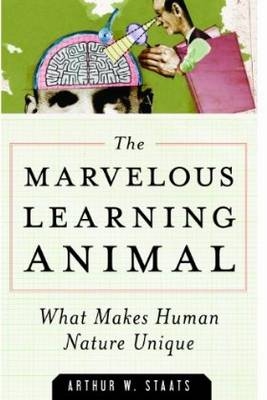
The Marvelous Learning Animal
What Makes Human Behavior Unique
Seiten
2012
Prometheus Books (Verlag)
978-1-61614-597-2 (ISBN)
Prometheus Books (Verlag)
978-1-61614-597-2 (ISBN)
- Keine Verlagsinformationen verfügbar
- Artikel merken
Offers an exploration into how our ability to learn makes humans and human nature unique. This title explores how evolution has endowed us with extremely versatile bodies and a brain of 100 billion neurons, making us especially suited for a range of sophisticated learning.
What makes us human? In recent decades, researchers have focused on innate tendencies and inherited traits as explanations for human behavior, especially in light of groundbreaking human genome research. The author thinks this trend is misleading. As he shows in great detail in this engaging, thought-provoking, and highly informative book, what makes our species unique is our marvelous ability to learn, which is an ability that no other primate possesses.
In his exploration of human progress, the author reveals that the immensity of human learning has not been fully understood or examined. Evolution has endowed us with extremely versatile bodies and a brain comprised of one hundred billion neurons, which makes us especially suited for a wide range of sophisticated learning. Already in childhood, human beings begin learning complex repertoires-language, sports, value systems, music, science, rules of behavior, and many other aspects of culture. These repertoires build on one another in special ways, and our brains develop in response to the learning experiences we receive from those around us and from what we read and hear and see. When humans gather in society, the cumulative effect of building learning upon learning is enormous.
The author presents a new way of understanding humanness-in the behavioral nature of the human body, in the unique human way of learning, in child development, in personality, and in abnormal behavior. With all this, and his years of basic and applied research, he develops a new theory of human evolution and a new vision of the human being. This book offers up a unified concept that not only provides new ways of understanding human behavior and solving human problems but also lays the foundations for opening new areas of science.
What makes us human? In recent decades, researchers have focused on innate tendencies and inherited traits as explanations for human behavior, especially in light of groundbreaking human genome research. The author thinks this trend is misleading. As he shows in great detail in this engaging, thought-provoking, and highly informative book, what makes our species unique is our marvelous ability to learn, which is an ability that no other primate possesses.
In his exploration of human progress, the author reveals that the immensity of human learning has not been fully understood or examined. Evolution has endowed us with extremely versatile bodies and a brain comprised of one hundred billion neurons, which makes us especially suited for a wide range of sophisticated learning. Already in childhood, human beings begin learning complex repertoires-language, sports, value systems, music, science, rules of behavior, and many other aspects of culture. These repertoires build on one another in special ways, and our brains develop in response to the learning experiences we receive from those around us and from what we read and hear and see. When humans gather in society, the cumulative effect of building learning upon learning is enormous.
The author presents a new way of understanding humanness-in the behavioral nature of the human body, in the unique human way of learning, in child development, in personality, and in abnormal behavior. With all this, and his years of basic and applied research, he develops a new theory of human evolution and a new vision of the human being. This book offers up a unified concept that not only provides new ways of understanding human behavior and solving human problems but also lays the foundations for opening new areas of science.
Arthur W. Staats is professor emeritus in the Department of Psychology at the University of Hawaii.
| Verlagsort | Amherst |
|---|---|
| Sprache | englisch |
| Maße | 152 x 229 mm |
| Gewicht | 454 g |
| Themenwelt | Sachbuch/Ratgeber ► Natur / Technik |
| Geisteswissenschaften ► Psychologie ► Humanistische Psychotherapien | |
| Geisteswissenschaften ► Psychologie ► Sozialpsychologie | |
| Geisteswissenschaften ► Psychologie ► Verhaltenstherapie | |
| ISBN-10 | 1-61614-597-8 / 1616145978 |
| ISBN-13 | 978-1-61614-597-2 / 9781616145972 |
| Zustand | Neuware |
| Haben Sie eine Frage zum Produkt? |
Mehr entdecken
aus dem Bereich
aus dem Bereich
Buch | Spiralbindung (2023)
Borgmann Media (Verlag)
21,95 €
Buch | Softcover (2024)
modernes lernen (Verlag)
19,95 €
PiD - Psychotherapie im Dialog
Buch | Softcover (2024)
Thieme (Verlag)
64,00 €


